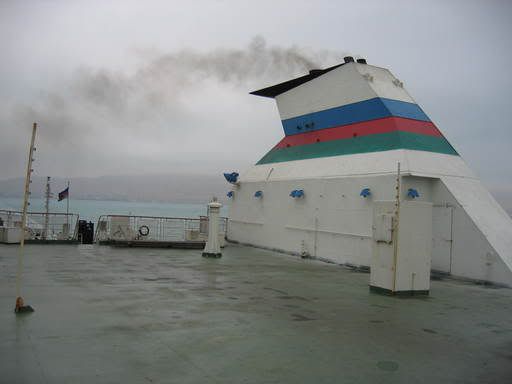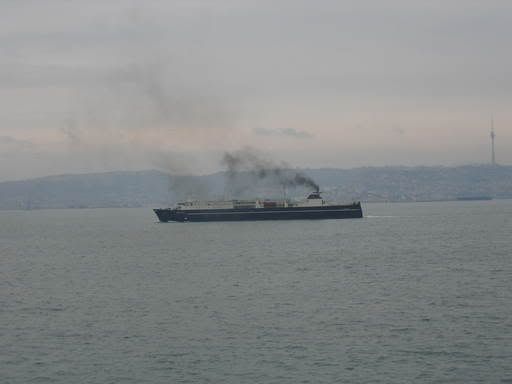Saturday, April 30, 2005
Floating Vomitorium
Sure, we had lots of WAZ adventures but the most colorful transport story comes from the ferry we took back to Baku. "Floating vomitorium" is a better description.
The former Soviet states serve as the red-headed stepchildren of the west. They get the hand-me-downs. When all your planes, boats and trucks fail to meet western environmental, efficiency or safety standards, where do you think they end up?
Our big, steel, corroding, smoke-belching hulk of a ferry transports rail cars between Turkmenbashi to Baku. It carried about 20 rail cars and had hundreds of cabins, all of which, except ours and the one next door, were empty of non-crew passengers.

Departing Turkmenbashi
In its past life, it provided service between Poland and Demark. We hoped "lack of seaworthiness" was not the reason it was demoted to duty on the Caspian.
"Schedule" in this part of the world is always loosely defined. Seeing the ferry at the terminal in Turkmenbashi when we pulled into town, our guide strongly suggested we go get on it, even though we hadn't planned to leave until the next day. There was no way to predict when the next one would show up and we had to be on one before our visas expired.
One of the dominant characteristics of the Caspian region, especially in spring, is the infernal wind. Weather delays in Baku and Turkmenbashi ports are very common.
A travel lesson we've learned -- but always seem to forget -- is to never ask, "how bad could it be?" Travel expands your imagination. I now know why it's not advisable to cross the Caspian in springtime and that, indeed, it can be pretty bad.
On board, we waited out one windstorm overnight in our tiny, dirty little cabin. We had been warned about the possibility of delay and the meager offerings in the ship's cafe, so we brought some food and water. We would have brought more had we known we'd have to share it with hordes of hungry ants.
Or that we'd be on board for 40 hours.
The whole issue of "what to eat" became moot about an hour after we left port.
"Boy, those waves are getting pretty big, aren't they?" I said to the Producer. He grunted without looking up from his book.
That was when things were relatively calm. Then wind and rain picked up.
This steel ship, carrying 20 rail cars, was being tossed around on the waves like a rowboat. It was too rough to read, play cards, walk, talk, or sit upright. It creaked and moaned every time it was slammed by a wave. An unlocked door in a vacant cabin banged against the wall with every rise and fall. Sterophonic retching from our neighbor's cabin passed through our walls.

See? This is a BIG ship
"We gotta get out of here."
We ran out into the maze of identical hallways, trying to find an exit to the deck where we could get fresh air. The shippy smell of diesel and grease was overpowering and repulsive, though I hadn't noticed it earlier and didn't notice it later.
We finally found a door: locked. Another door: locked. Apparently they don't want people being swept overboard in storms. Pondering briefly the safety implications of this policy, we ran back to our cabin and its hole-in-the-floor toilet.
Just in time too.
We spent the next 10 hours in a heap on the bed, rolling one way, then other, with the motion of the waves. Outside our porthole, which mercifully opened, the sea hissed and crashed.
Later, the "steward" knocked on the door to tell that while the ship had arrived in Baku harbor, we wouldn't be able to get off until the next morning.
In the cafe, we discussed the journey with our two fellow passengers over cherry juice and a bowl of tasty borsht. The middle-aged Azeri men worked for an American cargo company and make the trip frequently.
"This boat is old and terrible. That crossing was terrible. My friend was sick the whole time." He didn't need to tell us any of this, but we felt better, knowing that much more experienced hands were as debilitated as we were.
Later, I heard that my driver in Baku told my office manager, "they can't cross the Caspian. It's too windy." He didn't need to tell us that, but he was wrong.

Our sister ship, the Dagestan.
The former Soviet states serve as the red-headed stepchildren of the west. They get the hand-me-downs. When all your planes, boats and trucks fail to meet western environmental, efficiency or safety standards, where do you think they end up?
Our big, steel, corroding, smoke-belching hulk of a ferry transports rail cars between Turkmenbashi to Baku. It carried about 20 rail cars and had hundreds of cabins, all of which, except ours and the one next door, were empty of non-crew passengers.

Departing Turkmenbashi
In its past life, it provided service between Poland and Demark. We hoped "lack of seaworthiness" was not the reason it was demoted to duty on the Caspian.
"Schedule" in this part of the world is always loosely defined. Seeing the ferry at the terminal in Turkmenbashi when we pulled into town, our guide strongly suggested we go get on it, even though we hadn't planned to leave until the next day. There was no way to predict when the next one would show up and we had to be on one before our visas expired.
One of the dominant characteristics of the Caspian region, especially in spring, is the infernal wind. Weather delays in Baku and Turkmenbashi ports are very common.
A travel lesson we've learned -- but always seem to forget -- is to never ask, "how bad could it be?" Travel expands your imagination. I now know why it's not advisable to cross the Caspian in springtime and that, indeed, it can be pretty bad.
On board, we waited out one windstorm overnight in our tiny, dirty little cabin. We had been warned about the possibility of delay and the meager offerings in the ship's cafe, so we brought some food and water. We would have brought more had we known we'd have to share it with hordes of hungry ants.
Or that we'd be on board for 40 hours.
The whole issue of "what to eat" became moot about an hour after we left port.
"Boy, those waves are getting pretty big, aren't they?" I said to the Producer. He grunted without looking up from his book.
That was when things were relatively calm. Then wind and rain picked up.
This steel ship, carrying 20 rail cars, was being tossed around on the waves like a rowboat. It was too rough to read, play cards, walk, talk, or sit upright. It creaked and moaned every time it was slammed by a wave. An unlocked door in a vacant cabin banged against the wall with every rise and fall. Sterophonic retching from our neighbor's cabin passed through our walls.

See? This is a BIG ship
"We gotta get out of here."
We ran out into the maze of identical hallways, trying to find an exit to the deck where we could get fresh air. The shippy smell of diesel and grease was overpowering and repulsive, though I hadn't noticed it earlier and didn't notice it later.
We finally found a door: locked. Another door: locked. Apparently they don't want people being swept overboard in storms. Pondering briefly the safety implications of this policy, we ran back to our cabin and its hole-in-the-floor toilet.
Just in time too.
We spent the next 10 hours in a heap on the bed, rolling one way, then other, with the motion of the waves. Outside our porthole, which mercifully opened, the sea hissed and crashed.
Later, the "steward" knocked on the door to tell that while the ship had arrived in Baku harbor, we wouldn't be able to get off until the next morning.
In the cafe, we discussed the journey with our two fellow passengers over cherry juice and a bowl of tasty borsht. The middle-aged Azeri men worked for an American cargo company and make the trip frequently.
"This boat is old and terrible. That crossing was terrible. My friend was sick the whole time." He didn't need to tell us any of this, but we felt better, knowing that much more experienced hands were as debilitated as we were.
Later, I heard that my driver in Baku told my office manager, "they can't cross the Caspian. It's too windy." He didn't need to tell us that, but he was wrong.

Our sister ship, the Dagestan.




